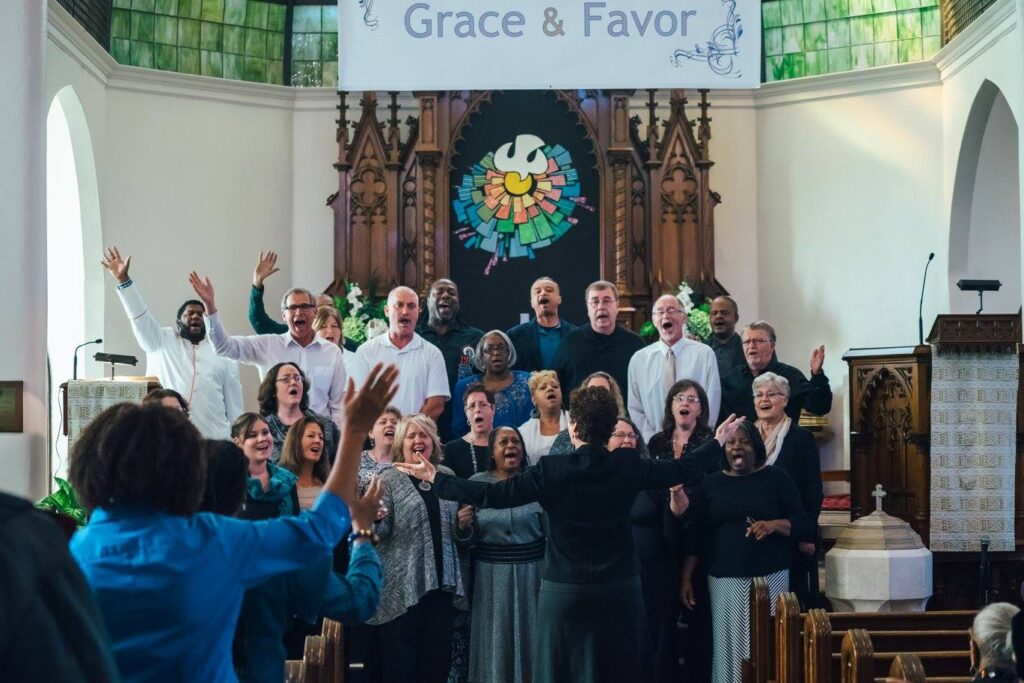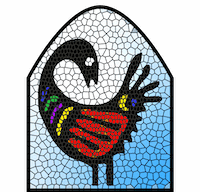
History of Bethel Lutheran Church
Bethel Lutheran Church was founded in a rented storefront at 4350 W. Lake Street on March 29, 1890, by a strong group of twelve German immigrant families who lived and worked in the community. The charter members of the church are recorded in the church ledger; a Pastor was elected and the congregation resolved that it would be in membership with a predecessor to the Metropolitan Synod. Bethel was a fledging congregation, but it managed to grow under the direction of Rev Paul Bieger.
In 1891, the church held its first confirmation and continued to raise money to purchase land for a permanent church home. Pastor Bieger left Bethel for health reasons and Rev. Freyschmidt was elected Pastor. Under the direction of a growing congregation, the parsonage was expanded and dedicated in 1894. The church installed the Rev. Albert Kaitschuk on June 5, 1895. Under Pastor Kaitschuk’s thirty-four years in leadership, the church outgrew its Lake Street location and moved to the 4300 block of Carroll Ave.
In 1903, the bustling congregation dedicated itself to building a new church that would stand the test of time. The new church was built on the corner of Keeler and West End. For Pastor Albert Kaitschuk, the church building at 130 N. Keeler and the parsonage at 4211 W. End were cornerstones of the Bethel’s faith and its commitment to community. When Pastor Albert died in 1929, congregation called his son Rev Oscar C. Kaitschuk to become the Pastor of Bethel Lutheran Church.
Pastor Oscar C. Kaitschuk served Bethel for thirty-five years from 1930 until Rev. David T. Nelson was called to pastor Bethel in 1965. The Bethelites of the Kaitschuk era were German and Eastern European immigrants but in the 1960s, a new wave of immigrants moved into West Garfield. This wave of amazing ancestors were African Americans who had long experienced the heartlessness and disappointment of segregation and racism but were determined to thrive by building new lives for themselves and their families. Pastor Nelson worked tirelessly to connect with these hard working and resolute individuals. He opened the church to the newcomers to West Garfield Park and Austin with enthusiasm, respect, and faith in their collective wisdom and power.
As Pastor David T. Nelson was being installed on August 15, 1965, the Illinois National Guard troops patrolled the streets of the Westside of Chicago. Their mission was to restore order after the uprising in 1965. By the time David Nelson became pastor, the German immigrant church had dwindled to about 15 families. Pastor Nelson took seriously the mandate to serve the community in Jesus’ name. In a fearful, angry and uncertain time, Pastor Nelson walked the streets, visited the new families, welcomed their children to activities at the church, and opened the doors to the ideas and the creativity of families in the neighborhood. The mission of the church was to serve the community in Jesus’ name.
This vision guided Bethel to form an ecumenical ministry with other churches in the aftermath of the upraising of 1965. Six local churches (Calvary Presbyterian, Garfield Park Baptist, St. Michael’s MB, St. Martin’s Episcopal, Bethel Lutheran and St. Mel Catholic) came together and lead to the development of the Christian Action Ministry (CAM). The partnership with other churches led to the development of CAM academy, CCA, and many other youth and educational programs. The creativity of the leaders of the church, now Black people, grew Bethel Christian School from 7 students to over 200.
In 1979 Bethel Lutheran Church established Bethel New Life to expand the church’s community ministry. Bethel’s Music Program drew many members, its youth choir, seniors, and Combined Choir which sang internationally with trips to Canada, Mexico City, Germany, and South Africa. Bethel New Life created Umoja Care to support seniors. As the community development arm of Bethel New Life rehabbed dozens of facilities and built dozens of homes to support home ownership, its reputation grew. In 1989, Bethel New Life purchased St. Anne’s Hospital and repurposed the facility for senior housing, a performing arts center, and community-based services. After 34 years of service to Bethel, Pastor Nelson retired on June 30, 1999, and his legacy passed to Reverand Dr. Maxine Washington.
Pastor Washington began a major renovation of Bethel church and created a vision of Bethel Church as ‘the friendliest church in the world.’ Pastor Washington helped the congregation expand youth outreach including Holy Hoops. Pastor Washington served Bethel for ten years.
Pastor Albert Starr encouraged the congregation to expand the community outreach through ministries such as Taste and See and Prison Visits, and Free Lunch Thursdays. A ministry model of Christian Education, Outreach, Resourcing, Evangelism and Equipping led to Bethel’s current focus on building the congregation. Pastor Starr served the ELCA and became a part-time Pastor at Bethel for twelve years.
Bethel’s leadership continues with Minister Rodger Jones, the Synodically authorized minister who grew up in Bethel Lutheran Church. His ministry honors Bethel’s history and its traditions. The symbol of our worship style is represented by the spirit of Sankofa, a symbol from the people of Ghana which means to learn from the past as one moves forward.
Bethel’s 135 Anniversary
To celebrate 135 years of continuous ministry on the westside of Chicago, Bethel is sponsoring an anniversary event titled To Bethel With Love. The event will be held on October 4, 2025, at the ELCA Headquarters at 8765 W. Higgins Rd from 1:00 pm-7:00 pm. The event includes an Anniversary Luncheon, a Gathering for information, sharing and legacy activities, and a Dance Party. In partnership with Dominican University, the church will share parts of its archival collection. Like Sankofa, we honor our past because it is important to learn from where we’ve been as we move forward to build the future ahead of us.
Legacy Matters: The Bethel Archival Project
There are thousands of families in Chicago and around the world who passed through Bethel’s doors in its 135-year history. With help from Dominican University’s School of Information Studies, the church is creating a digital archive and oral histories of those families. If you have a story to tell, an artifact to deliver, a request to make, contact Bethel at bethelccenter4215@gmail.com. Follow the link to see a sample of the digital archive.
Browse Our Historical Collection:
– Photo Galleries by Decade
– Oral History Collection
– Historical Documents
– Church Milestones
